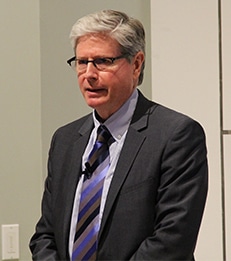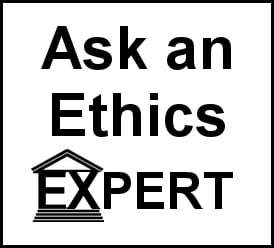Our Book Discussion With Jack Ewing and NYU’s Center For Sustainable Business
 On May 23, the NYU Stern Center for Sustainable Business and Ethical Systems welcomed Jack Ewing, European Economics Correspondent for The New York Times, for a discussion of his new book “Faster, Higher, Farther: The Volkswagen Scandal“.
On May 23, the NYU Stern Center for Sustainable Business and Ethical Systems welcomed Jack Ewing, European Economics Correspondent for The New York Times, for a discussion of his new book “Faster, Higher, Farther: The Volkswagen Scandal“.
Ethical Systems CEO Azish Filabi introduced Jack Ewing and discussed the ways in which this event exemplifies the mission of each center: “This event is a great opportunity for our two organizations to partner given the overlap between ethical failures and environmental impact at VW. That VW’s actions breached the trust of its customers, employees, and the government is an understatement. The emissions fraud represents not only disregard for good business practices, but also the necessity of businesses to be at the forefront of meeting global environmental challenges. It is precisely the type of management decisions we are educating Stern students NOT to make.”
Ewing, who has spent more than 20 years covering German business and economics, opened his presentation with a brief history of Volkswagen, which emerged in the late 1940s as the icon of post-war German regeneration. He detailed Volkswagen’s fraudulent emissions testing and took the audience behind the scenes to expose how this deception happened, who discovered it and how the company tried to cover up its misdeeds.

 Today’s businesses have morphed into revenue generators designed to squeeze every ounce of productivity and profit from its people and operations. Many corporate leaders see their role as the facilitator of shareholder enrichment. Coupled with a culture of instant gratification, it is not that shocking to see the reinforcement from the field as to what it means to be a successful enterprise.
Today’s businesses have morphed into revenue generators designed to squeeze every ounce of productivity and profit from its people and operations. Many corporate leaders see their role as the facilitator of shareholder enrichment. Coupled with a culture of instant gratification, it is not that shocking to see the reinforcement from the field as to what it means to be a successful enterprise. Ethical Systems seeks to highlight companies with a strong commitment to ethical, speak up cultures and trust. One of these companies is
Ethical Systems seeks to highlight companies with a strong commitment to ethical, speak up cultures and trust. One of these companies is  Expanding on our mission to curate and distil ethics research for the business community, Ethical Systems is proud to launch a new initiative soliciting questions to submit to one of our esteemed collaborators.
Expanding on our mission to curate and distil ethics research for the business community, Ethical Systems is proud to launch a new initiative soliciting questions to submit to one of our esteemed collaborators. 

 Over the course of a workday, people make innumerable decisions ranging in degrees of severity, from critical to mundane. Often times, choices are made in a vacuum and are considered for only as long as it takes until the next intellectual dilemma or distraction demands our attention.
Over the course of a workday, people make innumerable decisions ranging in degrees of severity, from critical to mundane. Often times, choices are made in a vacuum and are considered for only as long as it takes until the next intellectual dilemma or distraction demands our attention.  Scott Killingsworth, Senior Counsel with Bryan Cave, LLP, writes a broadly applicable and thought-provoking piece on nudges vs. culture. Killingsworth illustrates how a strong ethical culture can take the place of consistent, ongoing nudges and shows that culture should be considered through the lens of not just preventing ethical mishaps, but also about creating a positive environment “where the good apples can thrive”.
Scott Killingsworth, Senior Counsel with Bryan Cave, LLP, writes a broadly applicable and thought-provoking piece on nudges vs. culture. Killingsworth illustrates how a strong ethical culture can take the place of consistent, ongoing nudges and shows that culture should be considered through the lens of not just preventing ethical mishaps, but also about creating a positive environment “where the good apples can thrive”.